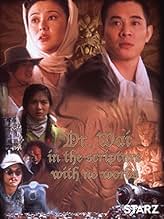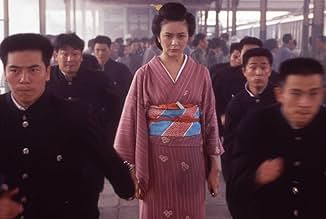NOTE IMDb
5,7/10
2,2 k
MA NOTE
Ajouter une intrigue dans votre langueA serial adventure writer with problems in his personal life lives out the adventures of his literary hero, King of Adventurers.A serial adventure writer with problems in his personal life lives out the adventures of his literary hero, King of Adventurers.A serial adventure writer with problems in his personal life lives out the adventures of his literary hero, King of Adventurers.
- Réalisation
- Scénario
- Casting principal
- Récompenses
- 1 victoire et 1 nomination au total
Collin Chou
- The Movie Star
- (as Sing Ngai)
- …
Avis à la une
DR. WAI IN "THE SCRIPTURE WITH NO WORDS" (Mao Xian Wang)
Aspect ratio: 2.39:1 (Anamorphic)
Sound format: Dolby Digital
A huge disappointment from director Tony Ching (DUEL TO THE DEATH, "A Chinese Ghost Story"), this lumbering would-be spectacular - conceived as a light-hearted riff on the Indiana Jones subgenre - finds paperback author Jet Li ploughing all of his frustrations from a crumbling marriage to Rosamund Kwan into a work of fiction where his brave alter ego (a 1930's soldier of fortune, also played by Li) seeks a magical scripture and is thwarted at every turn by a villainous seductress (also Kwan) and her evil cohorts.
The half-hearted script (by Szeto Cheuk-hon, Sandy Shaw and Lam Wai-lun) lurches from one overblown set-piece to another in search of a worthwhile narrative, combining lackluster comedy and predictable action scenes in a failed attempt at a modern epic. However, the combat sequences - choreographed by Ching himself, aided and abetted by Ma Yuk-sing (CAT AND MOUSE) - are staged with typical cinematic bravado, but the formula is wearing a little thin, and the intrusive comic asides serve only to drain tension from the various confrontations between Good and Evil. Stunningly photographed in an uncredited scope format by veteran cinematographer Tom Lau (DRAGON INN, THE EAST IS RED), the film conjures a vivid period atmosphere, and there's a couple of outstanding set-pieces - including a spectacular train crash; Li's encounter with a couple of Sumo wrestlers (don't ask!); and the final showdown with villain Billy Chow - though the climactic visual effects are poor by western standards. Li and Kwan, reunited from their successful teaming in the ONCE UPON A TIME IN CHINA series, are attractive and lively, while Takeshi Kaneshiro (CHUNG KING EXPRESS) and Charlie Yeung (FALLEN ANGELS) are largely wasted in routine supporting roles.
Plagued by budgetary problems following a disastrous fire which destroyed $HK10 million worth of sets, producers sought to bolster the film's international fortunes by hiring Tsui Hark to direct additional footage for a re-edited export version which drops the modern day sequences and rearranges the narrative in linear fashion. It doesn't help much, but the filmmakers at least deserve points for trying.
(Cantonese dialogue)
Aspect ratio: 2.39:1 (Anamorphic)
Sound format: Dolby Digital
A huge disappointment from director Tony Ching (DUEL TO THE DEATH, "A Chinese Ghost Story"), this lumbering would-be spectacular - conceived as a light-hearted riff on the Indiana Jones subgenre - finds paperback author Jet Li ploughing all of his frustrations from a crumbling marriage to Rosamund Kwan into a work of fiction where his brave alter ego (a 1930's soldier of fortune, also played by Li) seeks a magical scripture and is thwarted at every turn by a villainous seductress (also Kwan) and her evil cohorts.
The half-hearted script (by Szeto Cheuk-hon, Sandy Shaw and Lam Wai-lun) lurches from one overblown set-piece to another in search of a worthwhile narrative, combining lackluster comedy and predictable action scenes in a failed attempt at a modern epic. However, the combat sequences - choreographed by Ching himself, aided and abetted by Ma Yuk-sing (CAT AND MOUSE) - are staged with typical cinematic bravado, but the formula is wearing a little thin, and the intrusive comic asides serve only to drain tension from the various confrontations between Good and Evil. Stunningly photographed in an uncredited scope format by veteran cinematographer Tom Lau (DRAGON INN, THE EAST IS RED), the film conjures a vivid period atmosphere, and there's a couple of outstanding set-pieces - including a spectacular train crash; Li's encounter with a couple of Sumo wrestlers (don't ask!); and the final showdown with villain Billy Chow - though the climactic visual effects are poor by western standards. Li and Kwan, reunited from their successful teaming in the ONCE UPON A TIME IN CHINA series, are attractive and lively, while Takeshi Kaneshiro (CHUNG KING EXPRESS) and Charlie Yeung (FALLEN ANGELS) are largely wasted in routine supporting roles.
Plagued by budgetary problems following a disastrous fire which destroyed $HK10 million worth of sets, producers sought to bolster the film's international fortunes by hiring Tsui Hark to direct additional footage for a re-edited export version which drops the modern day sequences and rearranges the narrative in linear fashion. It doesn't help much, but the filmmakers at least deserve points for trying.
(Cantonese dialogue)
Thomas Weissman, who wrote a supposedly major text on Asian cinema (which unfortunately probably blocked publication of better texts for some time) pee-ed off a lot of fans of Hong Kong cinema. One of the reasons is that he knows dam' well the difference between a good movie and a good "genre" film, but, instead of developing this difference critically, he prefers to smudge it, and thus frequently leaves readers with misconceptions.
Weissman's review of this film promised a real avant-garde transgression of time and space, of pulp and serious narrative. I'm afraid that's not what's happening here.
For one thing, we get no closer to any of this characters than we do in any other Hong Kong genre film. That's important; to make real transgressions of time, space, genre, etc., we need to see what's going on from a particular point of view. (If one doesn't care for "The Singing Detective" - and I don't - then refer to "Slaughterhouse Five".) Since this is really an "action-comedy". it can't do that. Instead, it scrambles its plot around from several different points of view; but the heart of the narrative remains action, not 'perspective'.
Well, is it a good action comedy? yeah, I enjoyed it, I'll probably watch it again. IS it the super-duper-transgressive New-wave make or break film that Weissman and a few others have touted it as? Nope. For that see Wong Kar Wai's "Ashes of Time".
But not every film has to be really really serious or 'great'. This is a fun film, with some weird displacements of time and space, just to make it interesting. Enjoy it as such.
Weissman's review of this film promised a real avant-garde transgression of time and space, of pulp and serious narrative. I'm afraid that's not what's happening here.
For one thing, we get no closer to any of this characters than we do in any other Hong Kong genre film. That's important; to make real transgressions of time, space, genre, etc., we need to see what's going on from a particular point of view. (If one doesn't care for "The Singing Detective" - and I don't - then refer to "Slaughterhouse Five".) Since this is really an "action-comedy". it can't do that. Instead, it scrambles its plot around from several different points of view; but the heart of the narrative remains action, not 'perspective'.
Well, is it a good action comedy? yeah, I enjoyed it, I'll probably watch it again. IS it the super-duper-transgressive New-wave make or break film that Weissman and a few others have touted it as? Nope. For that see Wong Kar Wai's "Ashes of Time".
But not every film has to be really really serious or 'great'. This is a fun film, with some weird displacements of time and space, just to make it interesting. Enjoy it as such.
I have to disagree with one of the previous reviewers who said that this movie would be ideal for Hong Kong cinema neophytes. I believe that only HK fanatics should even attempt to watch it - the less experienced viewers will probably turn it off after about 30 minutes (it's no wonder that no American distributor picked it up for re-release; it certainly doesn't have the wide appeal of a movie like "Meltdown" / "High Risk"). The idea is ambitious, the production is lavish, but the story is confusing and unengaging, and the result is a film too bizarre and self-indulgent for most audiences. Jet Li once again proves that he can act (in a dual role, no less), but the vast majority of the fighting is over-the-top and (intentionally) unrealistic. There are some memorable moments, however, like his brief encounter with two huge sumo wrestlers! (**)
This movie is a fascinating film. First of all, the plot is very original. I liked the story-within-a-story approach to the plot. It deals with an adventurer going up against the Japanese for a mythical scripture. The events of the story parallel the life of the author of the story. What I liked about this film were the fight scenes. Most of them were short, unfortunately. However, they were fairly original. The viewer gets a chance to see Jet Li use tai chi, a chain, flaming swords, and his lethal feet. My only complaints were the fights scenes weren't that long. Otherwise, it's an entertaining film.
Jet Li stars as a writer of a series based on the character King of Adventures. When an accident puts him in the hospital, friends try to continue his current storyline for him. Great fun ensues as new twists and turns spring from the different characters adding to the story; including a pair of flying sumo wrestlers (!) and some well done CGI. A change of pace for the usually intense Li that's one of the most enjoyable HK movies of '96.
Le saviez-vous
- AnecdotesDuring production, a fire destroyed HK$10 million worth of sets, resulting in severe budget problems. In an attempt to limit the damage, the script was revised and many modern plots were added, resulting the film to have two different endings.
- Versions alternativesAlternate cut exists deleting the sequences set in current time and adding more sequences set in the adventure story.
- ConnexionsReferences Le magnifique (1973)
Meilleurs choix
Connectez-vous pour évaluer et suivre la liste de favoris afin de recevoir des recommandations personnalisées
- How long is Dr. Wai in the Scripture with No Words?Alimenté par Alexa
Détails
- Date de sortie
- Pays d’origine
- Site officiel
- Langues
- Aussi connu sous le nom de
- Dr. Wai in the Scripture with No Words
- Sociétés de production
- Voir plus de crédits d'entreprise sur IMDbPro
- Durée
- 1h 31min(91 min)
- Couleur
- Mixage
- Rapport de forme
- 2.35 : 1
Contribuer à cette page
Suggérer une modification ou ajouter du contenu manquant





































